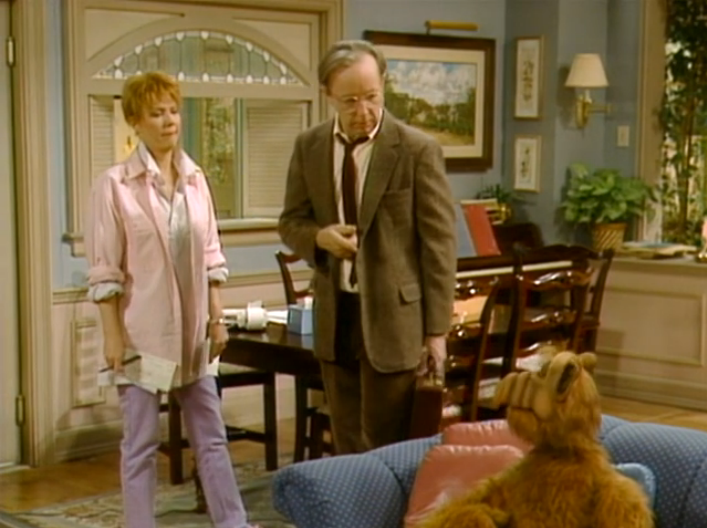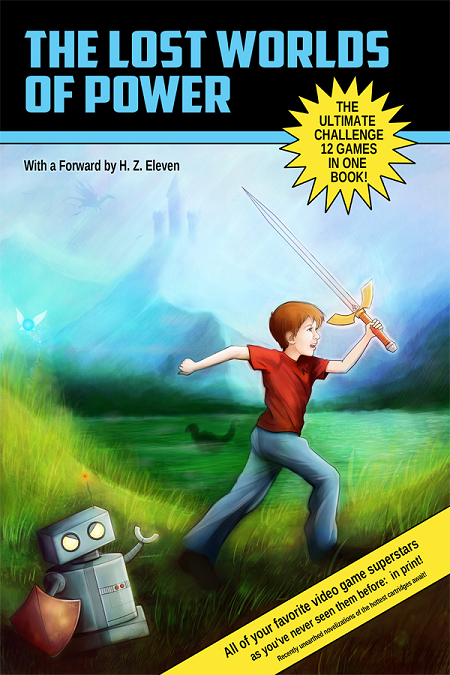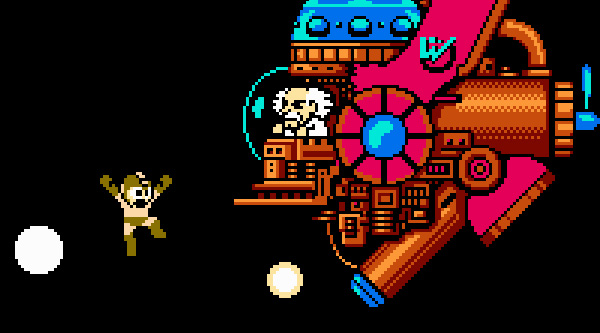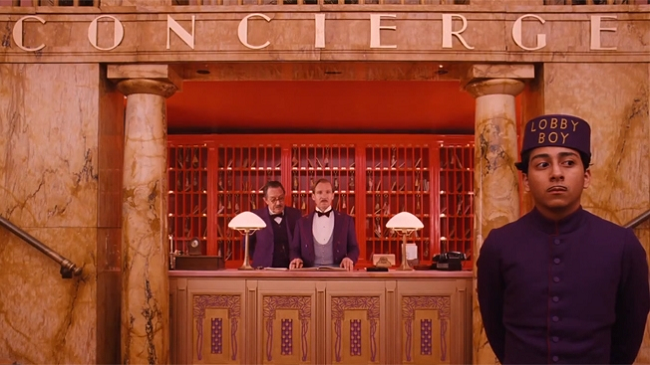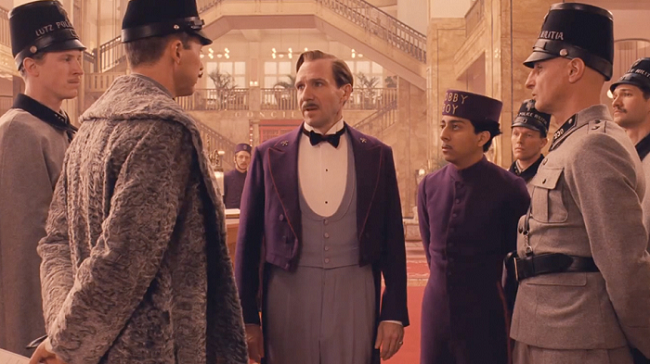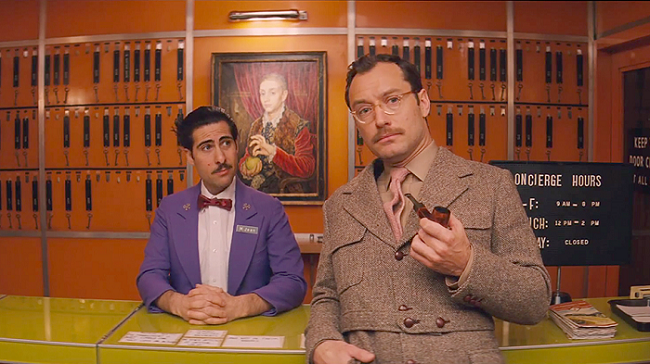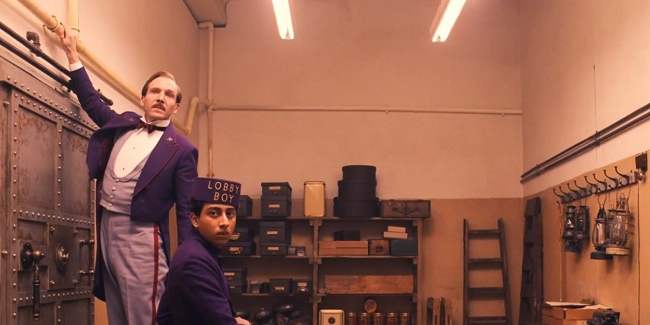Counting this episode, I have only three reviews left to do in season one. I’m…kind of amazed how quickly this has gone by. I mean, when all is said and done it will still have taken 25 weeks, which is nothing to sneeze at, but it doesn’t really feel that long. In fact, I’m almost sad that ALF only has four seasons.
Almost.
This one starts with ALF calling Willie home from work for an emergency: the TV broke. ha ha. That’s it. That’s the whole scene in one sentence.
Since there’s nothing more to talk about before the credits roll, I’ll take this opportunity to mention something that’s been on my mind for a while: the Tanners really have fuck-all to do with this show, don’t they?
In theory, the premise of ALF should be “a family secretly harbors an alien from outer space.” And you’d be forgiven for remembering the show as actually being about that. I sure as heck did. But now, watching it as an adult, it’s not that. It’s “an alien does whatever the fuck he pleases, with special guests: the other people in the house.”
I get the feeling this was the doing of Paul Fusco. The show itself looks like it’s built around the premise of a family dealing with their extra-terrestrial house guest, but in fact they’re just there. They almost never have anything to do that isn’t directly related to ALF, and even then they’re just passively responding to the shit that he pulls. They seem to have no say in their own lives, because they really don’t; the show is driven entirely by ALF. This is why they wait quietly while ALF delivers long monologues, react to his antics with funny faces or vague bemusement, and stand around asking “Where’s Poochie?” whenever ALF isn’t on screen.
Personally, I think that’s a big reason that ALF hasn’t had a cultural resuscitation of any kind, the way The Brady Bunch, The Addams Family, The Beverly Hillbillies, Dragnet, even the fucking Smurfs have had. Those are all relics of bygone eras in entertainment, and whether you like their rebirths or not — believe me, I won’t argue that you should — the fact is that their formats and universes allowed there to at least be a chance for rebirth.
With ALF, that’s not the case. Its format was nothing special, and its universe is non-existent. There is no universe; it’s just ALF. Unlike The Muppets, ALF doesn’t come with a storied history and limitless potential for comedy. He’s just one character…and not much of a character at that. He headlines the show, but doesn’t have the enthusiasm of Kermit. He’s tremendously self-centered, but not with the amusing vanity of Miss Piggy. He spits out one liners, but lacks the sadness at the heart of poor Fozzie. And he’s constantly pulling off zany shit, but the writers can’t think of anything “zanier” than stealing a lawnmower, which means even his most outlandish moments don’t measure up to Gonzo’s tamest ones.
Why am I comparing him to Muppets? Well, because The Muppets are a perfect illustration of why they were suited for a rebirth, and ALF is not: they’re more than what they do. There are always at least two levels at play with any given Muppet: what they’re doing, and what they’re feeling. Jim Henson and his crew didn’t rely exclusively on jokes to make people laugh…they relied on characterization. That’s why they’re suited for recontextualization; it’s worth putting them in new situations to see how they’ll react. With ALF, there’s no such need; he reacts the same way every time, regardless of context, because neither he nor anybody around him are actually characters.
Fusco clearly wanted ALF to be the star, which is fine. The problem is that by streamlining the rest of the cast — very often to the point of irrelevance — he’s not giving ALF anyone to bounce off of. He never gets to grow, develop, or surprise. He’s always just ALF, because Fusco imagines there’s only room in the spotlight for one.
If Fusco and his cronies were interested in creating an actual world for ALF to play in, we’d remember him more fondly. We’d be more interested in seeing him reinvented and recontextualized. But since there was never any context to begin with, what’s the point? By forcing ALF to be the star — not just of this show overall, but of every moment of this show — Fusco ironically ensured that he’d be completely forgettable.
See? Told you I had nothing to say about the intro.
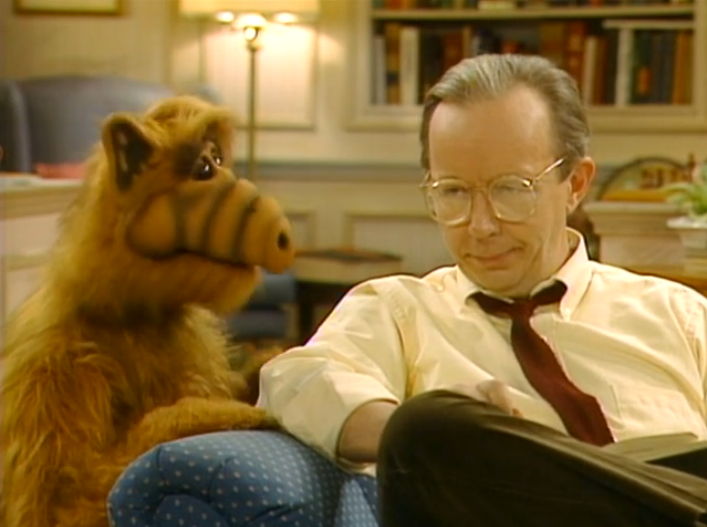
The broken TV seems to set the plot in motion…but really doesn’t. It’s another one of those episodes that feels like two unrelated scripts got stapled together and nobody cared enough to pull them apart. For most of the episode it seems like it’s going to be about the TV, but then all of a sudden it’s a Very Special celebration of the lovers, the dreamers and ALF.
God. Get Muppets on the brain once and they just don’t go away. Also, I can’t wait to see the new movie. The Great Muppet Caper is one of my favorite films of all time, and this seems like a feature-length celebration of that one. Can. Not. Wait.
Ugh, fucking ALF.
So anyway the TV is broken, which is yet another brilliant example of the kind of magical stories you can tell when your main character is a space alien. ALF paces around the living room at a loose end, because even he can’t figure out what he’s supposed to do with a plot like this. He bitches about the TV to Willie for a while, and then Brian comes in saying he needs help with his project for the Science Carnival.
The running joke is that the Science Carnival has clowns.
Re-read that sentence a hundred thousand times and tell me if it gets progressively funnier. If it doesn’t, you might as well skip this episode.
ALF says he’ll help Brian, but then Willie says the same thing, so ALF talks some smack about the “rain gauge” Willie invented that he found in Lynn’s closet. I don’t even know where to begin with that sentence. So I really fucking won’t.
Willie bristles that ALF made fun of this alleged piece of shit invention because he’s hella into meteorology dudes and totally has been forever, just like all those other hobbies of his that never get mentioned again, and then Brian goes off to do the project on his own because fuck these guys seriously fuck them.
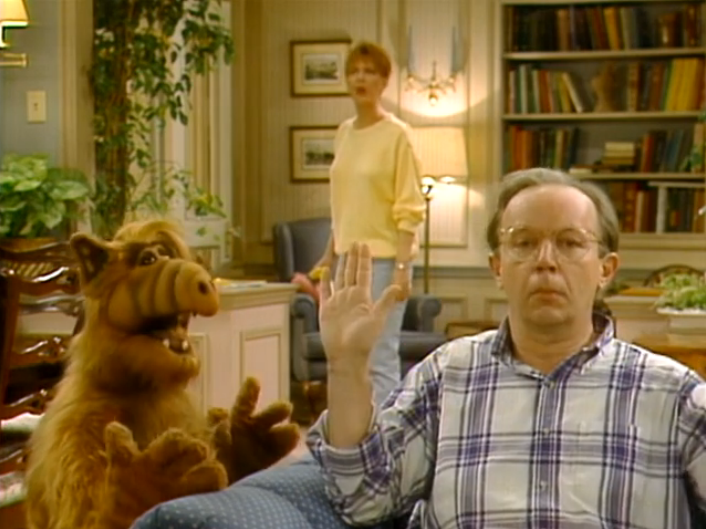
It’s another day and ALF is still pissing and moaning about the TV. Kate tells him he can have the portable TV in their bedroom, but that’s too small for King Dick of Cock Mountain. He wants Willie to have the big TV repaired, but Willie says he’s going to ship it back to the factory in Libya because it’s under warranty. I don’t know where to start with that sentence either SO I REALLY FUCKING WON’T.
Brian comes in with his model of the solar system which is a big pile of shit because nobody helped him with it.
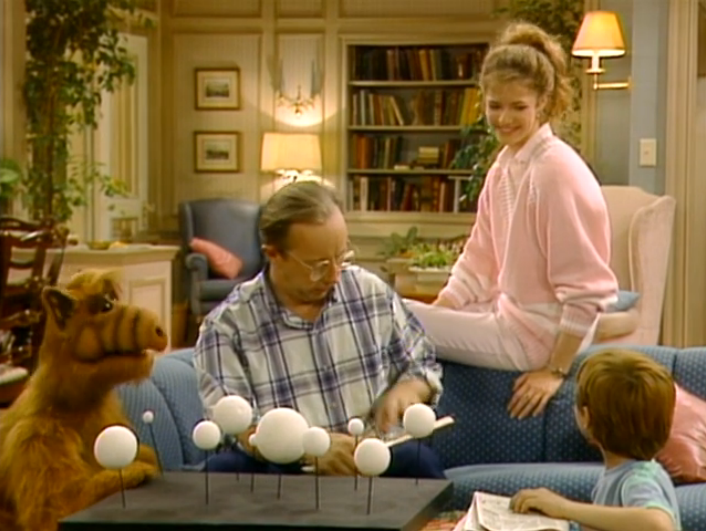
Why didn’t anyone help him with it again? Were ALF and Willie arguing about the TV for 24 hours a day? I know Brian walked off in the last scene, but couldn’t one of his god damned parents check in on him and offer to help at some point? What if he choked to death on one of these styrofoam balls? How many weeks would pass before these assholes even noticed?
They make a point of the fact that he did it alone, and I guess I’m glad they did because he entered the room with Lynn, which would have made me think she helped him. But, nope. I guess they just stuck her in this scene because they had nothing else to do with the character.
Why does she even exist? Nothing against Andrea Elson, who sure as hell doesn’t get much to work with, but if they killed off the character between episodes, would anything actually change in any way?
ALF says Brian is missing two planets out past Pluto: Dave and Alvin. Willie tells Brian not to listen to ALF, and so ends another extraordinary day of sitting around the living room with a space alien.
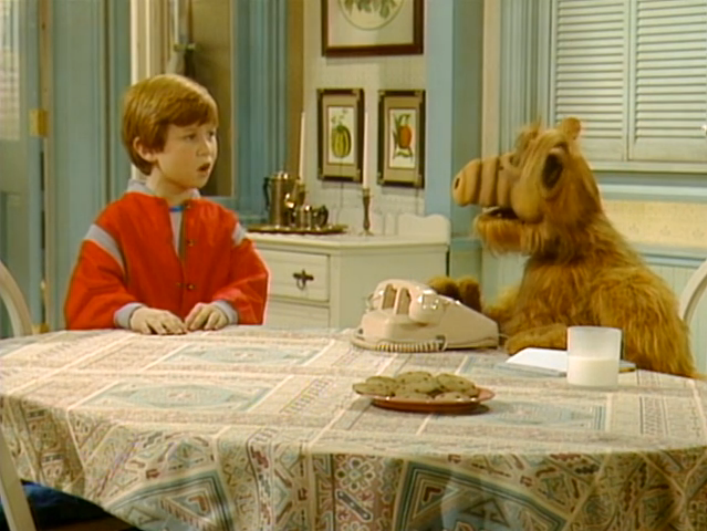
The next afternoon Brian comes home and gives ALF some serious ‘tude. Turns out he put those extra planets in after all, and now he’s banned from the Science Carnival. I can’t even take any joy from ALF being on the receiving end of some bitching for once, because Benji Gregory delivers all of his lines with a bizarre, misplaced inflection that makes him sound like the raw audio from a Peanuts special.
There is a good joke here, though: after Brian leaves, ALF picks up the phone — SEE HOW THERE WAS A PHONE ON THE TABLE SO THE PUPPET WOULDN’T HAVE TO MOVE THAT IS THE MAGIC OF HOLLYWOOD FOR YOU — and dials information, requesting the number for “Brian’s teacher.”
That’s funny! Just like the speed-reading joke from “Ochmonek of Darkness” was funny! And just like that joke, they immediately piss all over it. In this case it’s ALF realizing his mistake and correctly asking for the elementary school’s phone number. Hilarious. I’m so glad he figured it out; the last thing I’d want is for a sitcom to keep me laughing.
Then, after the commercials, we see this:
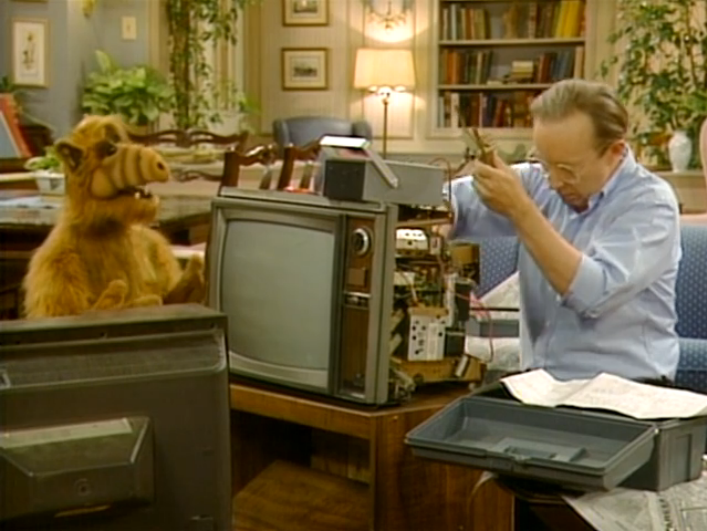
Uh…what? This scene was in “Try to Remember.” You know…that clip show from halfway through the season. I even had a caption contest about it.
At the time I thought it was some dumbass gag snipped from syndication — as, indeed, many of the clips in that episode were — but I guess they included a clip of an episode that wouldn’t even be shown until the end of the season? For crying out loud, the whole conceit of that episode is that the family is reminding ALF of the things they’ve been through so that he can get his memory back. In this case they reminded him of something that hadn’t actually happened yet.
My brain hurts.
So I guess this episode was filmed a long, long time ago…and just sat in the can until now. I’m not surprised; it’s certainly not a very good one. Maybe they were hoping to bury it toward the end of the season where nobody would notice it.
Anyway, yeah, you already know what happens here. Willie is fixing the TV, so ALF plugs it in while his hands are inside, reminding Max Wright of who’s boss around here.
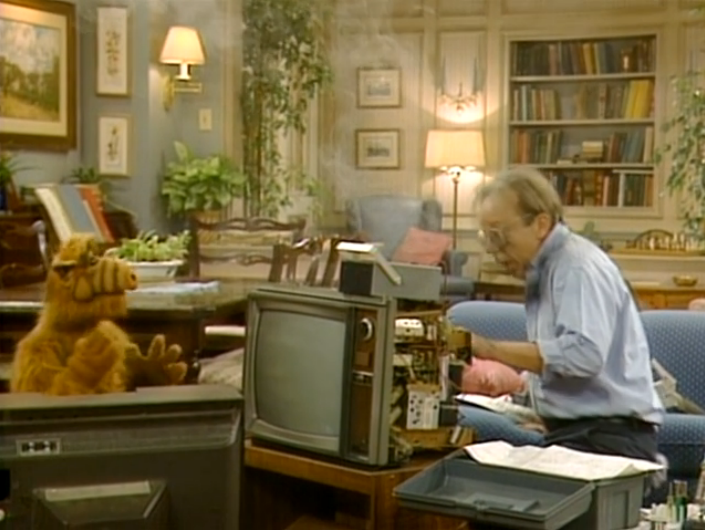
Lovely stuff. The fake audience whoops it up over the near fatal electrocution of a sitcom dad.
Somebody comes to the door, and ALF thinks it’s Consumer Ed, some TV personality who reports on scams and flams. He called the guy, apparently, even though the broken TV has nothing to do with any kind of scam at all as far as I can tell.
And I really thought it would be Consumer Ed, because this is ALF and who the fuck cares who comes to the door on what flimsy pretense anymore.
But, no! It’s…
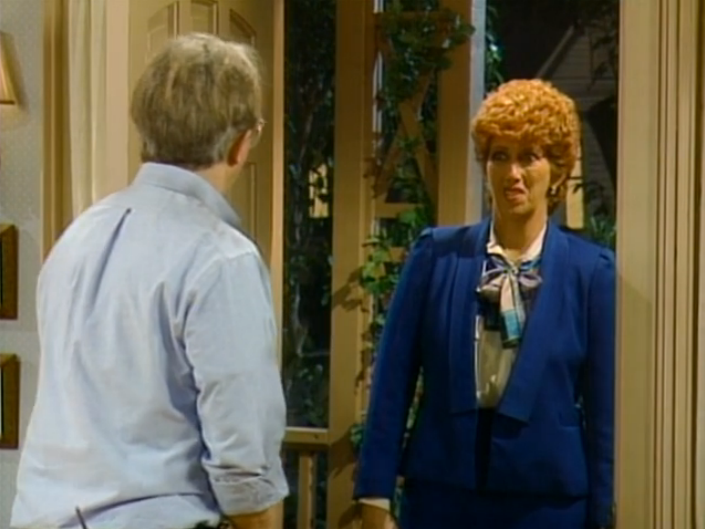
Marcia Wallace! Holy shit!
I’m genuinely surprised we get to see her again, because usually when I like a character on this show, Paul Fusco hits them over the head with a shovel and buries them under the shed. But, wow. Here she is.
She introduces herself as Principal Lyman, and since this episode was shot before the clip show in the middle of the season, I guess this is “technically” the introduction of the character, meaning we should have recognized who she was in “It Isn’t Easy…Bein’ Green.” But who cares…she’s always Marcia Wallace to me.
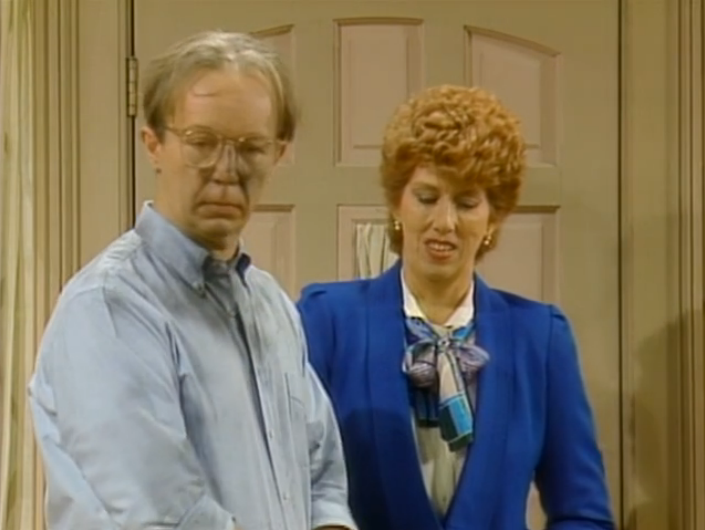
She wants to talk to Willie about the phone call he placed earlier to Brian’s teacher…one “Miss Larva.”
…yeah. Miss Larva. And the last time we saw Marcia Wallace, she was in an episode with something called Dr. Potato Famine. Man, ALF writing staff…save some hilarious names for the rest of us!
There is actually a really good moment when Marcia Wallace asks if Willie’s family is home. He says no. Marcia Wallace then says that she thought she heard him yelling at somebody before he opened the door.
Willie replies, “Oh, that was probably the TV.” And then we cut to this:
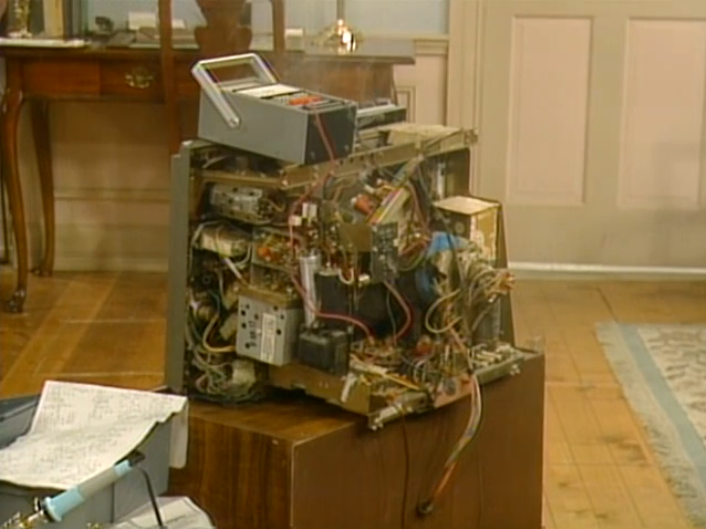
…which is the single funniest sight gag ALF has done.
It’s actually good. The rhythm of the joke is great, the timing of the cuts to and back away from the smoking TV is perfect, and the uncommon angle of the room helps it to stand out as a legitimately strong comic moment. Everything about this small gag works…it’s this show’s equivalent of cutting to Homer’s spice rack. It’s that good. Who let the One Good Writer into the editing room?
But, as they say, all things must pass. We still need to wade through the horse shit that constitutes the rest of this episode, so I hope you enjoyed your brief moment of fresh air.
Marcia Wallace sits down and refreshes Willie’s memory of the phone call, where he learns that he threatened to pull Brian out of school. Willie excuses himself and heads into the kitchen to hatefuck ALF.
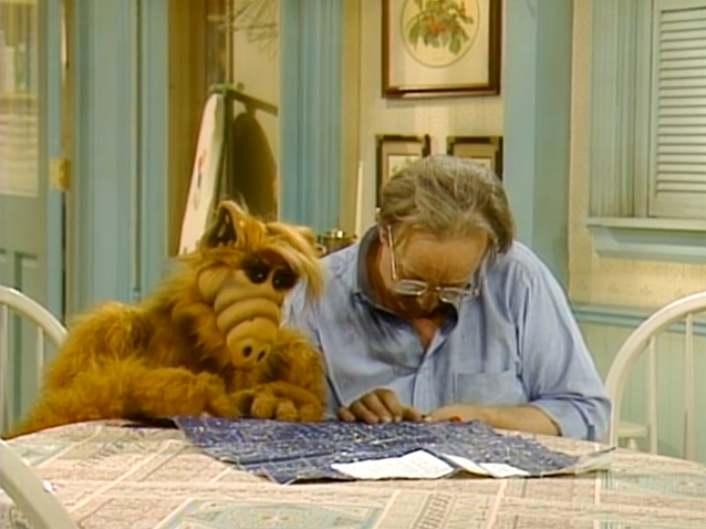
ALF, however, pulls out his Melmacian star chart, and proves to Willie that Dave and Alvin exist. In fact, Willie is able to identify Planet Dave as being “Chiron,” which was discovered in the late 70s — really, in our actual universe — and was briefly under consideration to be named a 10th planet.
I’m…more than a little bit shocked that the writers bothered to tie ALF’s fictional planet into some real-world cosmology. That’s actually kind of cool.
Willie is impressed, but he says he can’t tell Marcia Wallace about this. ALF questions him about it, asking why, and the laugh track takes a break so that Paul Fusco can deliver his big, stirring monologue about the importance of dreamers, about keeping an open mind, and all that hooey that nobody ever remembers ALF saying because it’s self-congratulatory bullshit.
Really, though, why can’t Willie tell this to Marcia Wallace? We’ve just established that Dave is actually Chiron, which does exist, and which he can prove to her. Can’t he just say that he was teaching Brian about Chiron, and that’s what the extra planet was? The second extra planet could be from a further discussion he had with his son, about how our knowledge is always expanding or something, and Brian took it to heart and added another planet to represent that.
I don’t know. I’m reaching. And for that to work somebody would actually have to buy Willie as being a good dad who would discuss things intelligently with his children or take an interest in their school work, so obviously that’s off the table. Still, he can explain at least one of these planets on non-insane non-Melmacian terms, so why wouldn’t he do that at least?
I guess it wasn’t a good idea for the writers to tie Planet Dave into real-life cosmological fact after all, since they’re now having the characters treat it like something only a space alien could know about. What was the point of doing the work to connect the fictional dots to our real ones if you then can’t have the characters do the same?
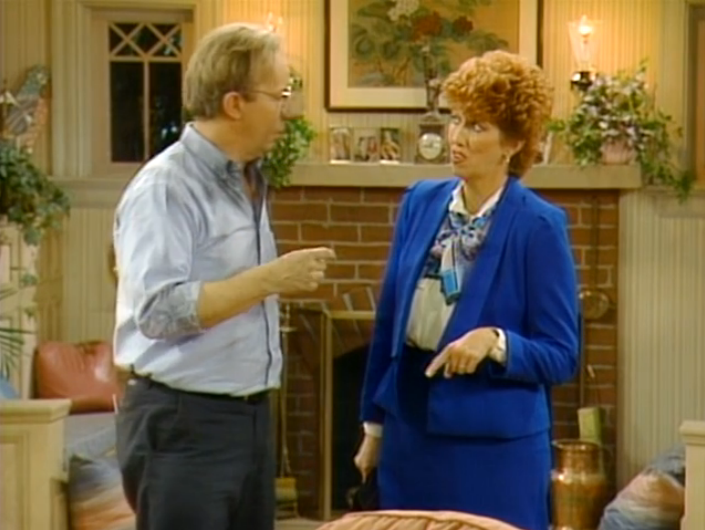
Willie pusses out of pussing out, though, and gives Marcia Wallace the same speech we just heard, about the importance of open minds and dreamers and here’s to the crazy ones and all that crap.
The doorbell rings again and it’s Consumer Ed because jesus christ this show.
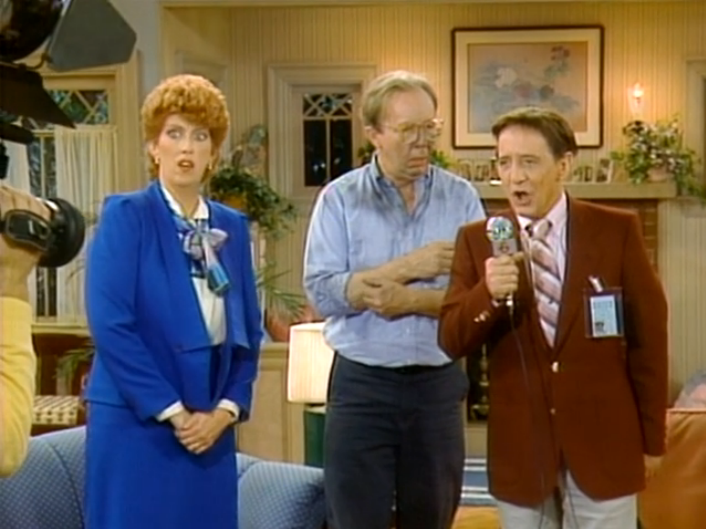
Consumer Ed starts talking about the TV, but Marcia Wallace thinks he’s talking about Brian getting kicked out of school, which makes no sense whatsoever because Willie didn’t even know she was coming over, so how in shit’s name could he have organized an intervention in the form of a live news broadcast?
At least, I assume it’s live, because Consumer Ed and his film crew hang around letting these idiots talk about the Science Carnival, which is not something he would ever do if he needed to film an actual consumer affairs report for later use. This has nothing to do with his assignment. At. All. If Consumer Ed went back to his boss with this tape of two nobodies talking about a fucking fourth grade space project they’d think he had a Howard Beale style meltdown and have him committed.
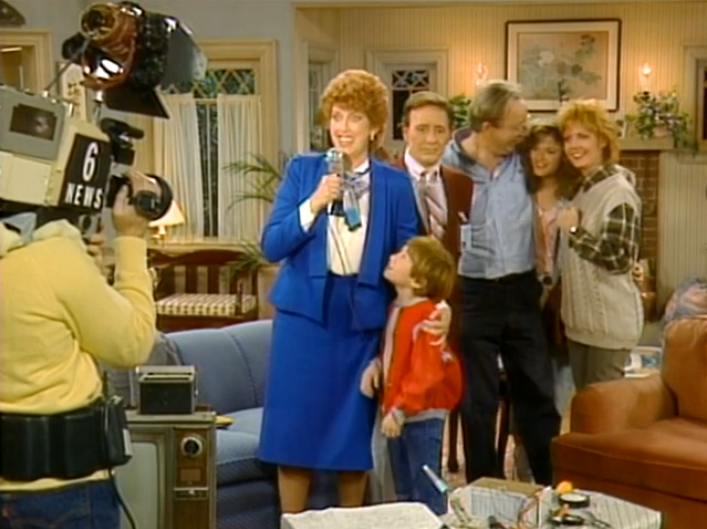
Anyway Kate, Brian and Lynn come home, and Marcia Wallace gives the dreamers speech a third time, so that it can go on the news, along with the announcement that Brian will be allowed to display his unpainted styrofoam balls on popsicle sticks in the Science Carnival.
…and I’m sorry, but I can’t hold this in any longer: yes, “dreamers” have a place in science. Yes, “dreamers” helped us achieve flight and circumnavigate the globe…both examples which are used by the episode. Yes. Yes.
But we just call them “dreamers.” They weren’t really, because things didn’t stop with the dream. They did research, they experimented, they attempted, they explored possibilities. In short, they were scientists. Maybe not by trade, but certainly by nature. We call them “dreamers” because that’s a nice and romantic way to put it…but what we really mean is that they pulled the dream down and turned it into fact through dedication and hard work.
Here, the opposite is happening. Yes, there’s a Planet Dave and a Planet Alvin. But thick-headedly insisting that they exist is not the same as proving they exist. The former might be the work of a dreamer, but is insistence without evidence the kind of thing science needs? Is that inspiring? Of course not. ALF and Willie may know those planets exist, but nobody else does. The inspiring thing would be to prove they exist. Fuck, Willie’s already got one in the bag. That is the kind of dreamer science needs. The kind that doesn’t just ask, “What if…?” and walk away, but the kind that asks, “How do we figure this out?”
The kind that does something. ALF (and then Willie, and then Marcia Wallace) seems to be endorsing the viewpoint that if you believe something and the facts that everyone else has access to don’t support it, they have no right to tell you you’re wrong.
But isn’t that kind of…false? At the very least, what you should do in that situation is gather facts that demonstrate that you’re right. That’s what science is. What ALF wants you to do is piss and moan until people stop telling you that what you believe is demonstrably false.
…you know, that guest appearance ALF made on Bill O’Reilly is suddenly making a lot more sense to me.
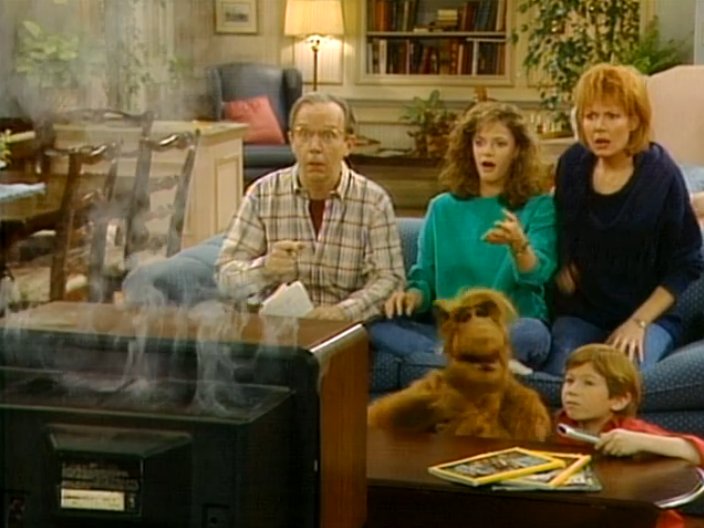
Ugh. ALF.
Anyway, the family gathers around to watch the news report, so I guess Consumer Ed really did finish and edit a piece about the grade school Science Carnival when what he was supposed to report on was consumer affairs. Is anybody in the entire ALF universe an even vaguely capable human being?
The family doesn’t get to hear all the angry calls from confused viewers, though, because the new TV starts to smoke and it catches fire and that’s the punchline of the entire episode so fuck you.
MELMAC FACTS: On Melmac ALF was known as Mr. Science, but can’t fix his space ship because he’s not good with tools. That’s also the reason he dropped out of dental school. Melmacians only have four teeth. ALF almost collided with Planet Alvin on his way to Earth. He also stopped on one of the planets to take a dump. God damn it.
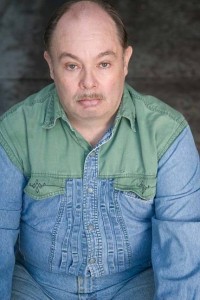 One of the things I really love about Facebook is that a huge portion of Tim & Eric’s stable of actors is not only active there, but are given a platform to reveal themselves as what they are: really, genuinely awesome human beings.
One of the things I really love about Facebook is that a huge portion of Tim & Eric’s stable of actors is not only active there, but are given a platform to reveal themselves as what they are: really, genuinely awesome human beings.